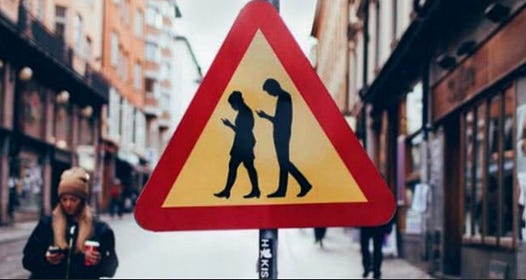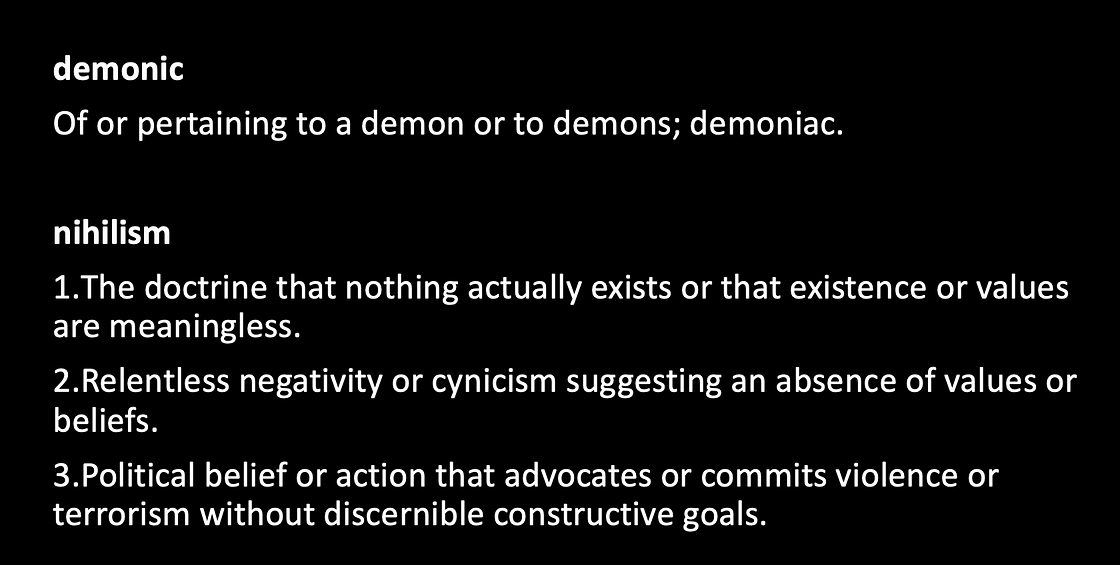“Demonic Nihilism”
August 10 | Posted by mrossol | American Thought, Malone, Personal Development, Social Engineering, Western CivilizationSource: “Demonic Nihilism”: – by Robert W Malone MD, MS
Jill and I are in Mountain View, California today. It turns out this is a long way from Virginia. And I am not just talking about physical distance.
Between a lovely VIP dinner with lovers of freedom last night and my speaking event tonight, I have an important interview about AI and a podcast with Shannon Joy. That gives me a few hours to get a Substack out. All on West coast time – which shifts us three hours. No problem. Life on the road is something we just adapt to.
As I woke up this morning, my mind turned to last night’s dinner conversation centered around good and evil, the state of the United States, and where do we go from here. How to we take back our country, our constitution, our children, in the face of great evil?
But what is this evil? This amorphous absence of good?
So an hour later in the morning, Jill and I found ourselves in the cafe at the upscale hotel where we are staying. We are temporarily lodging in the heart of “Silicon Valley”, at a hotel on the grounds of the old Moffett AirField. This hotel is mostly populated by California technocrats and business people. Clearly a wealthy, well educated clientele. As I watched the people in the cafe, I am thinking to myself that these should be “our people”, as both Jill and I were born and bred Californians. But the truth is we left California for good in 1996 and have never looked back. The state moved on and luckily for us, so did we.
The people who were starting their day in that cafe were getting coffee, green tea and breakfast. But these adults did not look like enlightened leaders of the free world; they were disheveled, clothing unkept and worn shoes dirtied. Others wore athletic clothes – mostly mismatched. As this was mostly an under-40 crowd; one would expect a certain level of fitness, but in fact most were over weight. Rolls of fat peeking out of too tight clothing. Surprisingly, women in particular seemed to care less what they looked like. All eyes were glued to screens – phones and computers. Even those in groups were quiet – as their attention was fixated on their personal entertainment devices. The absence of passion, the lack of vitality seemed to permeate the air. If there is one word for how people presented themselves, if would be dull. As if some vital essence of life had been sucked from their very souls.
As I observed people beginning their day. I felt a wave of sadness of what the People of this great nation, of the California state which once held such promise, have become.
Which is why the newest Unherd article titled, “America is now a zombie state: Demonic nihilism has infected the nation” (which is behind a paywall) resonated deeply in my soul.
Zombies. We have become a nation of zombies.
From the article:
…the approaching death by senescence of the American experiment in ordered liberty. The problem goes well beyond presidential dementia. The US Senate (from the Latin senex, “old”) looks more like the waiting room of a geriatric neurologist than a council of wise elders. There’s Mitch McConnell, prone to falls and freeze-ups; wheelchair-bound and confused Dianne Feinstein; and John Fetterman, who at only 53 is less fit for public service than any other member of that formerly august body. It’s as if C-SPAN, a network that televises congressional hearings, decided instead to air absurdist, post-apocalyptic horror films.
The zombification of the Capitol — not to mention our city streets, which have become permanent encampments of the dazed and disturbed — is merely a symptom of the underlying disease. Like all institutions, politics falls apart without regular infusions of constructive energy. A modern democracy is healthy only if its major parties grow organically from their voters, representing their interests by habit and inclination even more than conscious effort.But the grassroots politics Tocqueville admired when he visited the US in the 1830s gave way long ago to the top-down astroturfing of technocratic managerialism. Our governing elites represent no one but themselves and their cronies, and they don’t welcome shocks to the system. Insurgent candidates such as Robert Kennedy Jr. and Vivek Ramaswamy, whose public elevation of the concerns of many Americans aims to revitalise national politics, are censored and met with active resistance, even by their own parties.
It’s not just in politics that the wellsprings of individual and social vitality have dried up. Americans are marrying less and later, and having too few children, to reproduce themselves and the families that nurtured them. What is more, our public schools have largely ceased to transmit the accumulated knowledge and civilisational wisdom of the past to the children we do have. A taste for historical repudiation has taken hold across the culture, leading curators to “contextualise” art, city governments to take down statues, colleges to rename buildings, and publishers to censor or rewrite books. But creativity withers when it ceases to be nourished by the oxygenated blood of the tradition. Little wonder that Hollywood increasingly cannibalises its legacy by pouring old films into new plastic scripts.
Technology has exacerbated our national enervation. We have become charging-stations for our smartphones, which drain psychic energy with insistent distractions and overloads of information-babble. Video calls and work-from-home limit in-person interactions with actual existing individuals, who would otherwise be together for most of their weekly waking hours. Targeted advertising, fine-tuned algorithms, and politically stratified social media sharply decrease our exposure to new ideas. We are immuring ourselves within our own private caves, watching flickering images in darkness.
AI language-learning models offer a cautionary parable of these larger cultural developments. Programs such as ChatGPT, whose writing remains formulaic and prone to errors, learn by sifting through a sea of digitalised text, a growing share of which consists of AI-generated content. The predictable result of this feedback loop is the kind of levelling we’ve seen across our institutions. Like newspapers that drink their own ink — and which ones don’t, these days? — their product can only get worse.
Cultural exhaustion, social withdrawal, and the general enfeeblement of life forces are the practical expression of a will to nothing. There is a name for this spiritual and intellectual condition, and it is nihilism. Nihilism is demonic to the extent that the will to nothing is still a will, a life force. That it is only a negative one is by no means reassuring, because it is easier and more economical to tear down than to build up. Destruction is dramatic and accomplishes the illusion of vitality with relatively little energy. And who in this apocalyptic time, including the nihilist, doesn’t want to feel even a little alive?

This is our fight. This is a battle of good against evil. Our individual and national sovereignty combined with Judeo-Christian values against a dark force that has no values, no center, no compelling moral compass. Just darkness, an abyss of narcissistic self entertainment and gratification.
What is the root cause of this nihilism? This unholy darkness? How do we fight it? Are people tearing down the very fabric of our nation, just to be able to feel something? A lazy person’s way to feel passion?
Is this great nation to be lost in a single generation, sacrificed on the alter of depersonalizing technology?
The passion to build up versus the passion to tear down is a critical component in all of this. We must build for good, for the future.
We must fight not just to resist the encroachment of evil, but actively for the cause good.







Leave a Reply
You must be logged in to post a comment.